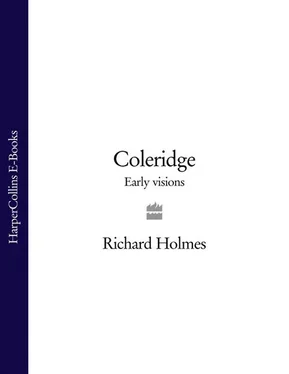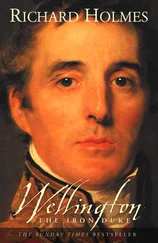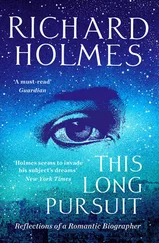Indeed, on the surface at least, I hope this book will read like the most traditional form of popular narrative biography. Coleridge is such a difficult subject – his personality so complex, the exact nature of his literary gift so protean, his daily life contained so much in pure ideas – that the real challenge for me has been simply to unearth his “human story”, his living footsteps through the world. Even his vast array of friends, among the living and among the dead, have not been allowed to obstruct the tale unnecessarily, but find a subsidiary place in a form of dramatis personae listing, “Coleridge’s Circle”, at the end of the book.
The tendency of much recent scholarship, following the example of Professor John Livingston Lowes in The Road to Xanadu (1927, see Bibliography), has been to see Coleridge’s whole imaginative existence as one gigantic booklist, the life of “a library cormorant” (Coleridge’s own mocking phrase), alive only in annotations and influences. Instead, I have taken Coleridge into the open air. I have made the fullest use possible of the superb editorial work of E. L. Griggs on the letters, and Kathleen Coburn on the Notebooks (an epic of modern exegesis). I have emphasised Coleridge’s physical presence as much as his metaphysical one (Leigh Hunt said shrewdly that he was “a mighty intellect put upon a sensual body…very metaphysical and very corporeal”): he seemed to learn as much from landscapes as from literature; as much from children’s games as from philosophic treatises; as much from bird-flight as from theology.
Despite the traditional form of my narrative, I have tried certain biographical experiments, two of which might be mentioned. Coleridge is remembered as the greatest talker of his age – that ephemeral form most difficult to re-create in biography (unless you are James Boswell, at your subject’s elbow). So I have attempted, from the very start, to set Coleridge talking , to tell his story through his own magnificent – and constantly humorous – flights of phrase and metaphor. I have tried to make his voice sound steadily through the narrative, and indeed in the end to dominate it. So what I have written is critical biography partly in the form of Romantic monologue. (As Madame de Staël once said in exasperation, “ avec Monsieur Coleridge, c’est tout à fait un monologue ”.)
Secondly, I have introduced a series of footnotes – if the reader should care to pause for breath – which does not so much add information in the traditional scholarly way, as initiate another level of speculation, a third perspective – besides those of Coleridge and his narrator. They are intended as a sort of down-stage voice, reflecting on the action as it develops, and suggesting lines of exploration through some of the biographical and critical issues raised. *They are, I suppose, my humble equivalent of Coleridge’s marginal “gloss” to the Ancient Mariner.
But it will be clear from them, as from the book as a whole, that in the subliminal battle of imagination between subject and biographer, upon which all life-writing ultimately rests, Coleridge has very properly – and wonderfully – triumphed. He is the visionary hero of my book, a hero for a self-questioning age; though whether comedy, tragedy, or romance prevail, remains to be seen.
Coleridge was always fascinated by anything that promised poetical marvels or metaphysical peculiarities. The subject of his own childhood was no exception. “Before I was eight years old,” he used to begin in his hypnotic manner, “I was a character – sensibility, imagination, vanity, sloth…were even then prominent & manifest.” And then, like the Ancient Mariner, there was no stopping him.
In later life he talked of boyhood and schooldays with many of his closest friends, and wrote vividly about it in his poetry, his letters, his Biographia , and his private Notebooks. In all these records, a rich mixture of tragi-comedy, he developed the self-portrait of a precocious, highly imaginative child, driven into “exile” in the world, before he was emotionally prepared for its rigours, by the early death of his father. Cut off from the universe of nature and family affections, he saw himself as an exceptional creature, both intellectually brilliant and morally unstable. He was to make it one of the archetypes of Romantic childhood. This is the picture he presented to his brother George, a sober clergyman, in a poem written at the age of twenty-five:
Me from the spot where first I sprang to light
Too soon transplanted, ere my soul had fix’d
Its first domestic loves; and hence through life
Chasing chance-started friendships. 1
Thirty years later, at the age of fifty-five, talking to his physician and confidant, the surgeon James Gillman, he expressed the same feelings, though now raised into the sonorous prose of his late manner. “When I was first plucked up and transplanted from my birthplace and family, at the death of my dear father, whose revered image has ever survived in my mind…Providence (it has often occurred to me) gave the first intimation, that it was my lot, and that it was best for me, to make or find my way of life a detached individual, a Terrae Filius …” 2He was to be a solitary voyager, an archetypal “son of the Earth”, an orphan of the storm, flung out to wander over the world in search of visions. Or so, most wonderfully, he said.
Samuel Taylor Coleridge first “sprang to light” in the vicarage of the small market-town of Ottery St Mary in Devon, one autumn morning on 21 October 1772. He was the youngest often children, an unexpected fruit of late vintage; his father, the vicar, was already fifty-three years old and his mother forty-five. They both adored him – a large, fat, greedy baby with a shock of unruly black hair, and huge grey astonishing eyes. “My Father was very fond of me, and I was my mother’s darling – in consequence, I was very miserable.” 3
He was christened after his godfather, a local worthy, Mr Samuel Taylor, and always known in the family as “Sam”, a name he grew to dislike with poignant intensity. Like many a youngest child he was petted and indulged, and almost his earliest memory was of being specially carried out by his nurse to hear a strolling musician playing ballads in the moonlight, during the harvest festivities.
To hear our old Musician, blind and grey,
(Whom stretching from my nurse’s arms I kissed,)
His Scottish tunes and warlike marches play,
By moonshine, on the balmy summer-night… 4
Nursery tradition told of his waywardness and inquisitive mischief. When “carelessly” left by his nurse, he crawled to the fire and pulled out a live coal, badly burning his hand; a Promethean incident also fondly recalled in his poem “To an Infant” (1795). When, at the age of two, he came to be inoculated, he howled when the doctors tried to cover his eyes. It was not the pain, but the concealment of the mystery which upset him. “I manifested so much obstinate indignation, that at last they removed the bandage – and unaffrighted I looked at the lancet & suffered the scratch.” 5He was to do something like that for the rest of his life.
The large West Country family in which he grew up was in many ways a remarkable one. Eight of them were boys (one died in infancy), and all showed talent either for soldiering or scholarship. Their father, the Reverend John Coleridge, was not only vicar of Ottery, but also headmaster of the local King’s Grammar School, a man who inspired them with notions of duty and excellence which had a profound effect on their upbringing. He referred to them, with Old Testament pride, as his “tribe”. All the boys were securely launched in their careers at the time of his sudden death in 1781, except for little Sam who was not quite nine. The effects of this early bereavement were to run very deep for the youngest child.
Читать дальше












